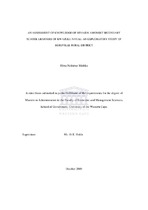An assessment of knowledge of HIV/AIDS amongst secondary school learners of Kwazulu-Natal: an exploratory study of Bergville rural district
Abstract
The main purpose of the study was to assess and explore the knowledge of HIV/AIDS among secondary learners in rural Bergville district of KwaZulu-Natal. A stratified random sample of 100 learners was selected from two secondary schools in the area. Data was collected using a questionnaire and interviews were scheduled with the teachers from the selected schools. The questionnaire was administered to a sample of 54 learners from school A and 46 from school B. The mean age was 16, with age range from 13-20. The participants were enrolled for grade 8-12 in both schools. Both qualitative and quantitative data on learners‟ knowledge and perception about HIV/AIDS, condom use and sexual issues including their attitudes towards people living with HIV/AIDS were collected in the questionnaire. Chi-square test was used for statistics purpose to test if the HIV knowledge of learners were associated with gender, culture and religion. Qualitative interviews with 9 teachers from both schools were conducted. The main purpose of the interviews was to investigate the management of HIV/AIDS in public schools in rural areas. Furthermore, to assess the learner‟s attitude towards HIV/AIDS education provided in schools. The results showed that the learners in Bergville district were more knowledgeable of HIV/AIDS through HIV/AIDS education in schools that had limited effect on gender, culture and religion. Quantitative findings presented, indicated no significant differences between those learners attending church and cultural activities that offer HIV/AIDS awareness programmes and those who do not with regard to the knowledge of HIV/AIDS. However, culture stood out to be associated with one item on the knowledge of whether school children can get HIV/AIDS (p-value = 0.04). On average, the level of knowledge of HIV/AIDS between female and male learners was similar. The major findings on both quantitative and qualitative findings confirmed that learners‟ knowledge levels were very high for modes of transmission and prevention of HIV/AIDS. Despite this knowledge, poor behavioural change among learners is a major setback thus increasing high risk of contracting HIV. Adequate knowledge about issues of cure, HIV testing and treatment was of concern in the findings in this study. Furthermore, data from qualitative interviews with the teachers highlighted the lack of multisectoral response to HIV/AIDS in Bergville rural communities which thus compromise the effectiveness in management of HIV/AIDS in schools. In summary, the study revealed some of the challenges faced by teachers and learners in regard to HIV/AIDS education.

